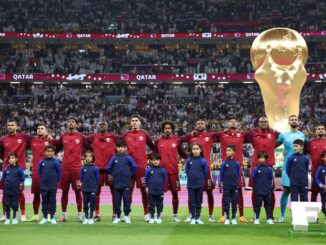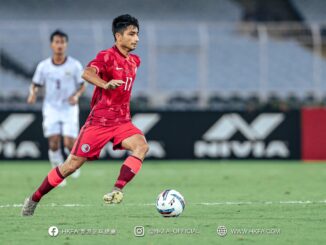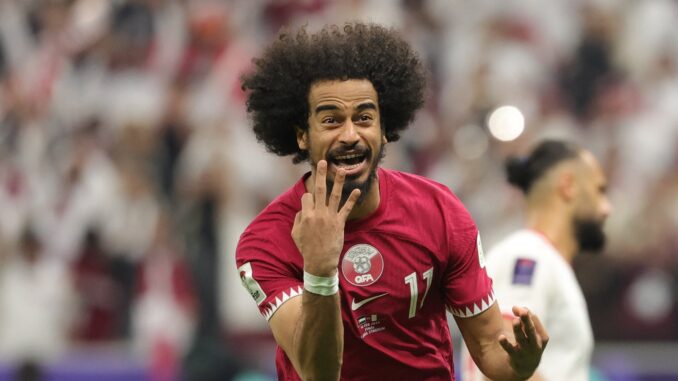
Four weeks of twists and turns, comebacks and shocks, the AFC Asian Cup 2023 may have been delayed seven months longer than we all had expected, but it eventually proved to be well worth the wait.
It started and finished in fitting symmetry, eventual MVP Akram Afif opened and closed the scoring at the same end of the same Lusail Stadium, some 29 days apart; five years on from closing the scoring at the last Asian Cup in Abu Dhabi no less.
While Qatar went on to record their second Asian Cup title in succession, the tournament can be considered anything but predictable.
None of the pre-tournament title favourites consistently impressed, even the notable dark horses stumbled towards the final stretch. The sight of Jordan and Qatar lining up on centre stage on Saturday evening was a ‘pinch me’ moment for any supporters in attendance – this really was the tournament no one could have predicted.
What it lacked in predictability, it made up for in drama and intrigue, which leaves Asian football arguably at the peak of its powers; stronger and deeper than ever before, further underlining the importance and magic of the Asian Cup as a continental institution.
Another vindication for the powers that be, was in their decision to expand the tournament five years ago. A decision that has materialised to be a masterclass in legislative foresight.
Fears that a bloated competition, that increased from 16 to 24 teams for the first time in the United Arab Emirates in 2019, would dilute the quality on display, have been comprehensively answered in only its second outing.
Tajikistan made it through to the quarter-final stage on debut, the likes of Malaysia and Indonesia returned to the competition to challenge the elite on the continent, while even Hong Kong pushed UAE and Iran hard.
From a distinct feeling of Us vs. Them in 2019; the challenge from those on the fringes came out in an aggressive and optimistic mood this year.
In that respect, Qatar 2023 will be looked back on as a crucial stage in Asian football’s international development.
Fresh on the heels of arguably the most impressive Asian showing at a FIFA World Cup in history, to experience such a highly competitive environment with countless surprise outcomes across the tournament, underlines the strength in depth Asia can now boast.
Simply in the presence of Jordan and Qatar in the final, not only two teams few truly thought capable of making it to the latter stages, but two teams all but exclusively built of players plying their trade outside the holy grail of Europe, truly demonstrates the plethora of talent competing in Asian football at the moment.
That level of optimism wasn’t just contained to the top two performers in Qatar, either.
From the attacking fluidity and effectiveness of early pacesetters Iraq, the strength and brimming potential of a young Uzbekistan side, to the vibrancy and energy of every fan’s new second favourite team, Tajikistan. Everywhere you looked, another hidden gem was emerging to prominence on the biggest continental stage.
The headline writers were equally unexpected; Mousa Al-Taamari was persistently direct, posing and ruthless, Oday Dabbagh, a livewire few could ever deal with, Alisher Shukurov, a late squad call turned young national star, alongside the vitality of Abbosbek Fayzullaev and Ali Jassim, who underlined the continent’s potential for the next generation. The tournament had variety, and impact across the board.
Football fans may have come for Son Heung-min, but they left wanting more of Yazan Al-Naimat.
The priority of Asian football over the last decade has focused on producing and moving talent as quickly as possible to Europe’s top divisions. This tournament moved the needle on that as an unequivocal assertion.
Qatar 2023 laughed in the face of those that continue to paint much of Asia as a footballing backwater, with a feeling of adamant justification, that despite their relative unknown status on the continental and world stage, unheralded nations could illustrate their ability to compete with anyone.
That in many ways cemented the true triumph of this tournament – that of belief, encapsulated best in the feeling around the host nation and eventual champions, Qatar.
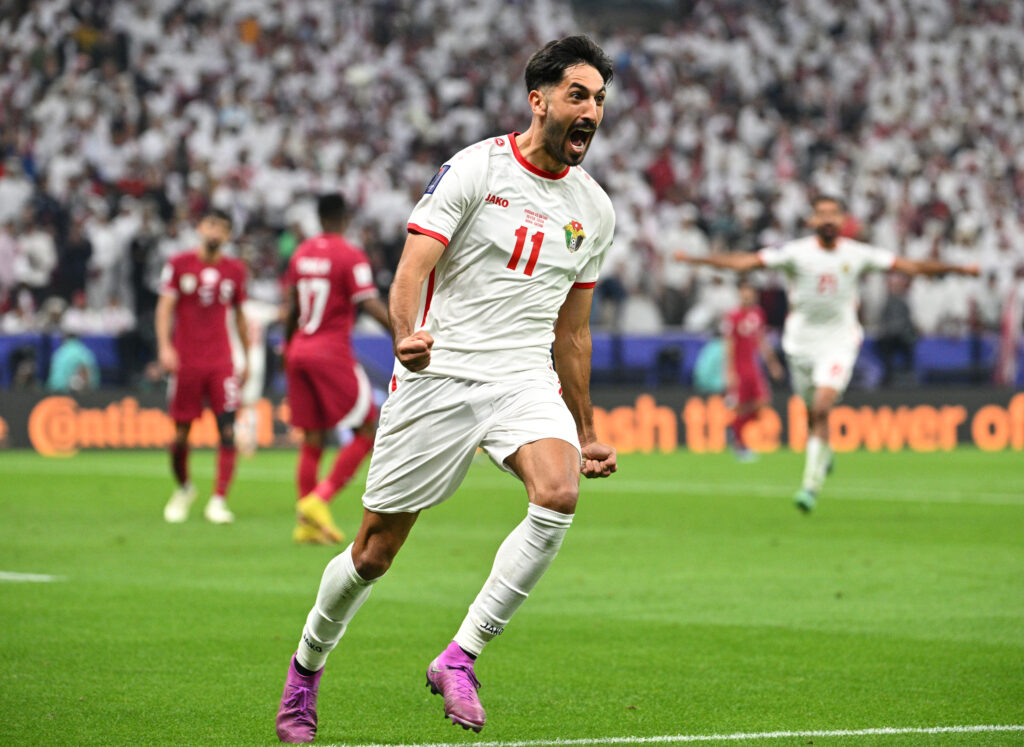
Merely 14 months ago, they succumbed to the crippling pressure and slanted scrutiny football in the Middle East endured in the build-up to the World Cup, belligerently derided for its “lack of footballing history” by the onlooking world. A team under the microscope with little to gain and everything to lose; it was an environment that forced them back into their shell, rather than into a rallied response.
A year on, however, with scrutiny alleviated, Qatar has been a vibrant, passionate footballing host, spurring on a team with confidence to push their true capability, without the need to satisfy outside expectations.
Those that fell instead, were those with the most expected of them, but arguably those with the most to do to reinvent themselves. It was truly a tournament to forget for Asia’s elite.
Following such as successful showing in the very same location, only a year prior, Asia’s big five, that spearheaded Asia’s attack on the rest of the world, returned to Qatar to find few friends amongst their neighbours.
Some struggled to adjust under new management; the well-paid installations of Jurgen Klinsmann at Korea Republic and Roberto Mancini at Saudi Arabia, which may have looked a recipe for disaster at appointment stage, look even more misguided now.
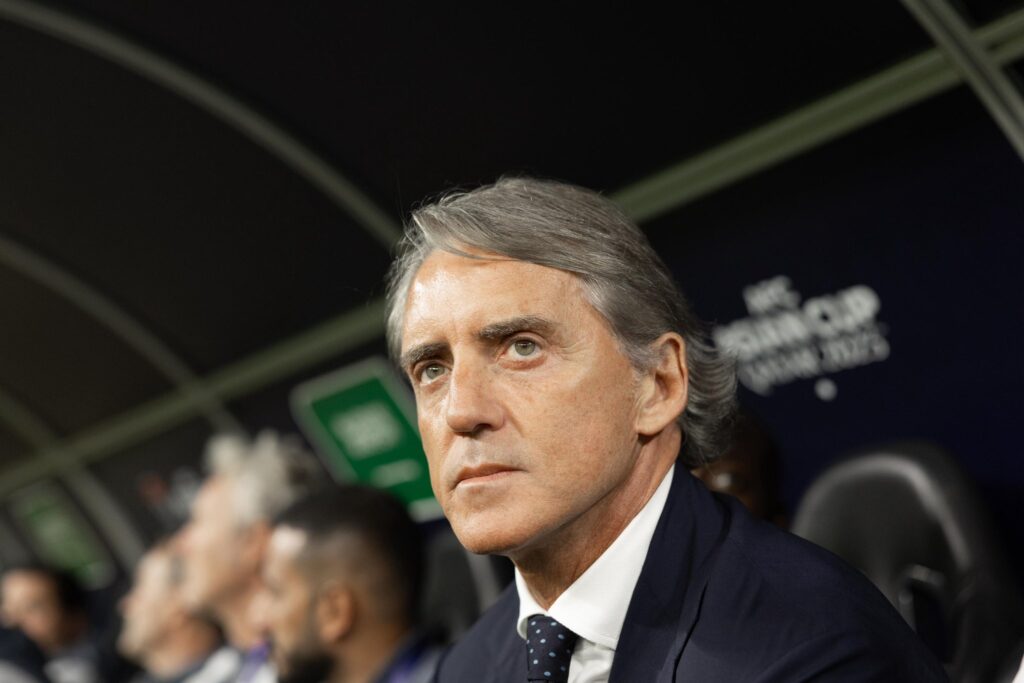
Iran may have felt more vindicated in their managerial choice, but even Amir Ghalenoei couldn’t manage to navigate the semi-final hurdle at which the Persians continually fall. Despite a last roll of the dice for this golden generation, Iran return empty handed, with a significant renovation job to come.
For Australia and pre-tournament favourites, Japan, it felt like a World Cup hangover neither could shrug off. Little has arguably changed in their approach, or their personnel, but the momentum was clearly lost, ultimately out thought and fought in key individual moments.
As Graham Arnold admitted on Australia’s return home, he already had his mind (or as he said, two eyes) on the next World Cup. What he, and his four peers will have learnt from Qatar, however, is take your eye (or both) off this continental stage and you’ll be repeatedly punished.
With World Cup qualification hurtling back into focus within the next month, time for any sort of inquest will be over in a flash.
The truth remains, that for these five in particular, the World Cup is of most importance in their future plans, with the Asian Cup a mere staging post or “testing ground” as Arnold alluded to, on their way to the Americas in two years’ time; a stage that will, of course, welcome further continental representation.
Away from the field, Asian football relished in a true celebration of the continent’s social culture. The Asian Cup remains the priority piece of silverware for players and fans alike, so to see the rapturous celebrations from Qatar to Jordan and Iraq to Indonesia, the tournament has been brought to life by those in the stands, putting to bed any suggestion that this would materialise yet another sleepy Gulf hosted championship.
The tournament returns to the West of Asia in three years’ time, in neighbouring Saudi Arabia. While scorn has already been poured on another regional hosting of the continental showpiece, the last month will have only directed positive change in any doubter’s mind.
For now though, as Afif and Co. party into the coming week, Asian football follows them. The rest of the world may look on with indifference, but this tournament remains the pinnacle of continental football in Asia. And this year was one of the better ones indeed.
Photo: Asian Football Confederation
Listen to The Asian Game Podcast LIVE from Souq Waqif as we reflect on the AFC Asian Cup 2023



